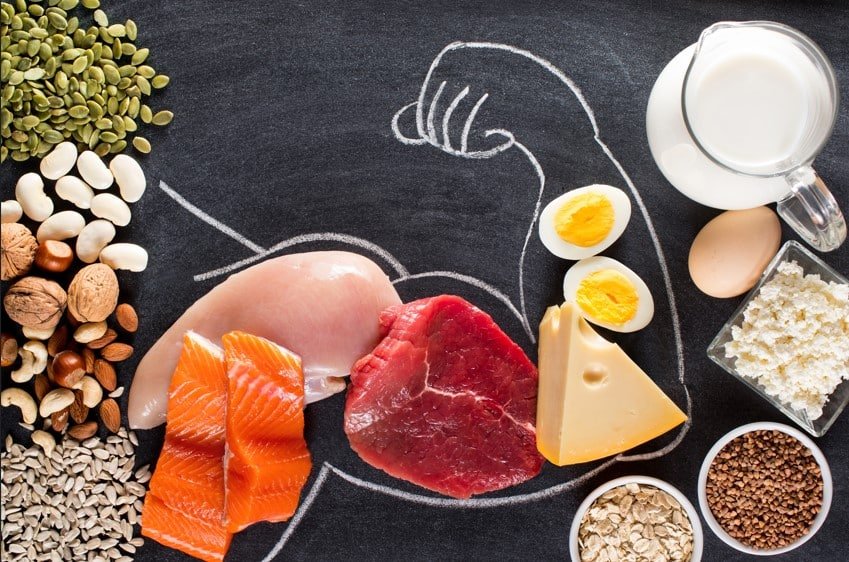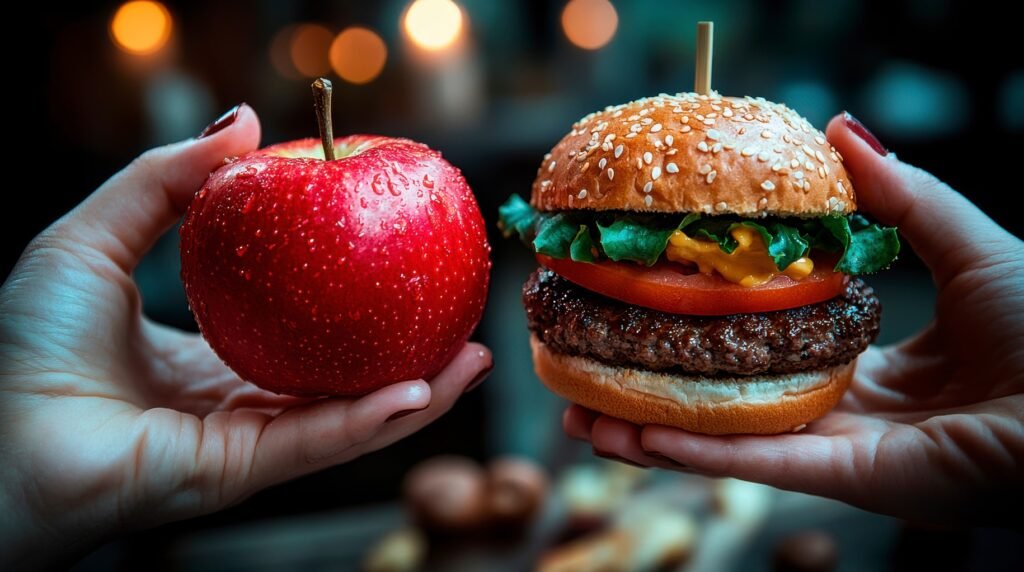Alright, folks, let’s cut to the chase. If you’re here, you’re probably looking to pack on some serious muscle. Well, you’ve come to the right place. Today, we’re diving deep into the world of protein – the building blocks of muscle hypertrophy you’re after. But not all proteins are created equal, and if you want to maximize your muscle growth, you need to know which ones are worth your time and which ones are just, well, chicken feed.
Table of Contents
- What Protein is Best for Muscle Building?
- The Science Behind Protein and Muscle Growth
- Animal Proteins vs Plant Proteins: The Showdown
- What are the Top 5 Highest Protein Foods?
- Plant-Based Protein Options
- The Collagen Conundrum
- Optimal Protein Intake for Muscle Hypertrophy
- Practical Tips for Incorporating Protein into Your Diet
- Common Myths About Protein and Muscle Growth
- Conclusion
- Frequently Asked Questions
- References
Now, I’ve spent years in the trenches – both as a researcher and as someone who’s put their body through the wringer in the pursuit of muscle. And the science is clear: when it comes to building muscle, animal proteins are the heavyweight champions. For more detailed insights, see the science of muscle growth.
But before we get into the essentials, let’s lay out some ground rules. This isn’t about pushing a particular diet or lifestyle. It’s about cold, hard facts backed by research. Whether you’re a meat-eater, a plant-based warrior, or somewhere in between, understanding the role of different protein sources in muscle growth is crucial for making informed decisions about your nutrition.
So, buckle up, buttercup. We’re about to embark on a protein-packed journey that’ll leave you with all the knowledge you need to fuel your muscle-building journey. From the science of muscle protein synthesis to the showdown between animal and plant proteins, we’re covering the best protein sources for muscle growth. By the time we’re done, you’ll be a protein pro, ready to make gains like never before.
Key Takeaways:
- Animal proteins generally outperform plant proteins for muscle growth, especially in younger adults.
- Whey protein is the king of rapid muscle protein synthesis, while casein provides a slow and steady amino acid release.
- Optimal protein intake for muscle growth ranges from 1.6 to 2.2 grams per kilogram of body weight daily.
- Protein distribution throughout the day is crucial for maximizing muscle protein synthesis.
- While plant proteins can support muscle growth, they may require more strategic combinations to match the effectiveness of animal proteins.
- Collagen protein, despite its popularity, is inferior to whey for muscle hypertrophy.

What Protein is Best for Muscle Building?
Protein is the building block of muscle, and if you’re not getting enough, you’re leaving gains on the table. However, not all proteins are created equal. Some pack more punch than others when it comes to building that coveted muscle mass.
Let’s cut through the noise and get to the meat of the matter (pun intended). Animal proteins have been shown to edge out their plant-based counterparts in the muscle-building arena. Why? It’s all about quality and amino acid content. Think of amino acids as the Lego blocks of protein. Animal proteins typically come with a full set of these blocks, ready to construct muscle faster than you can say”flex.” Plant proteins? They’re often missing a piece or two, making the building process a bit more challenging. Even the best protein sources for muscle growth can vary in amino acid composition.
Now, I’m not here to start a protein war. Plant proteins have their place, and they can certainly contribute to muscle growth. But if you’re looking to maximize your gains, animal proteins might just be your secret weapon. In this article, we’ll dive deep into the world of proteins, exploring everything from whey to peas, and uncover which sources will give you the best bang for your buck when it comes to building muscle. We’ll look at the science, debunk some myths, and give you practical tips to incorporate these muscle-building powerhouses into your diet. For more detailed insights, you can explore the science of muscle growth.

The Science Behind Protein and Muscle Growth
Let’s dive into the essentials of how protein actually builds muscle hypertrophy. Trust me, it’s not just about chugging protein shakes and hoping for the best. There’s some serious science behind this process, and understanding it will help you make smarter choices about your protein intake. For a deep dive into understanding this process, consider reading more about the science of muscle growth.
First off, let’s talk about muscle protein synthesis (MPS). This is the process where your body creates new muscle proteins. Think of it as your body’s way of building and repairing muscle tissue. When you work out, you’re essentially causing tiny tears in your muscle fibers. Your body then kicks into repair mode, using protein to patch up these tears and make your muscles stronger and bigger.
Now, here’s where it gets interesting. Protein isn’t just one thing – it’s made up of building blocks called amino acids. There are 20 different amino acids, and 9 of these are considered essential, meaning your body can’t produce them on its own. You need to get these from your diet.
These amino acids play crucial roles in muscle building:
- They serve as the raw materials for new muscle tissue.
- They stimulate MPS, essentially telling your body to start building muscle.
- They help reduce muscle breakdown, which is just as important as building new muscle.
But not all amino acids are created equal when it comes to muscle growth. Enter leucine, the superstar of the amino acid world. Leucine is like the foreman on a construction site – it signals your body to start building muscle. Studies have shown that leucine is particularly effective at stimulating MPS, more so than other amino acids.
Here’s a quick breakdown of leucine content in different protein sources:
| Protein Source | Leucine Content (g per 100g of protein) |
|---|---|
| Whey Protein | 10-12 |
| Egg White | 8.5 |
| Chicken Breast | 7.5 |
| Soy Protein | 7.8 |
As you can see, animal proteins tend to be higher in leucine, which partly explains why they’re often more effective for muscle growth. But it’s not just about the leucine content. The overall amino acid profile matters too. Animal proteins are generally considered”complete” proteins, meaning they contain all the essential amino acids in the right proportions that your body needs. Plant proteins, on the other hand, are often”incomplete,” missing one or more essential amino acids. Legume proteins are a common choice for plant-based diet s.
Now, don’t get me wrong – this doesn’t mean plant proteins are useless. It just means you need to be a bit more strategic if you’re relying on plant proteins for muscle growth. Combining different plant protein sources can help you get a complete amino acid profile. Here’s the kicker though – it’s not just about eating a ton of protein. Your body can only use so much protein at once for muscle synthesis. This is why it’s important to spread your protein intake throughout the day rather than trying to get it all in one massive meal.
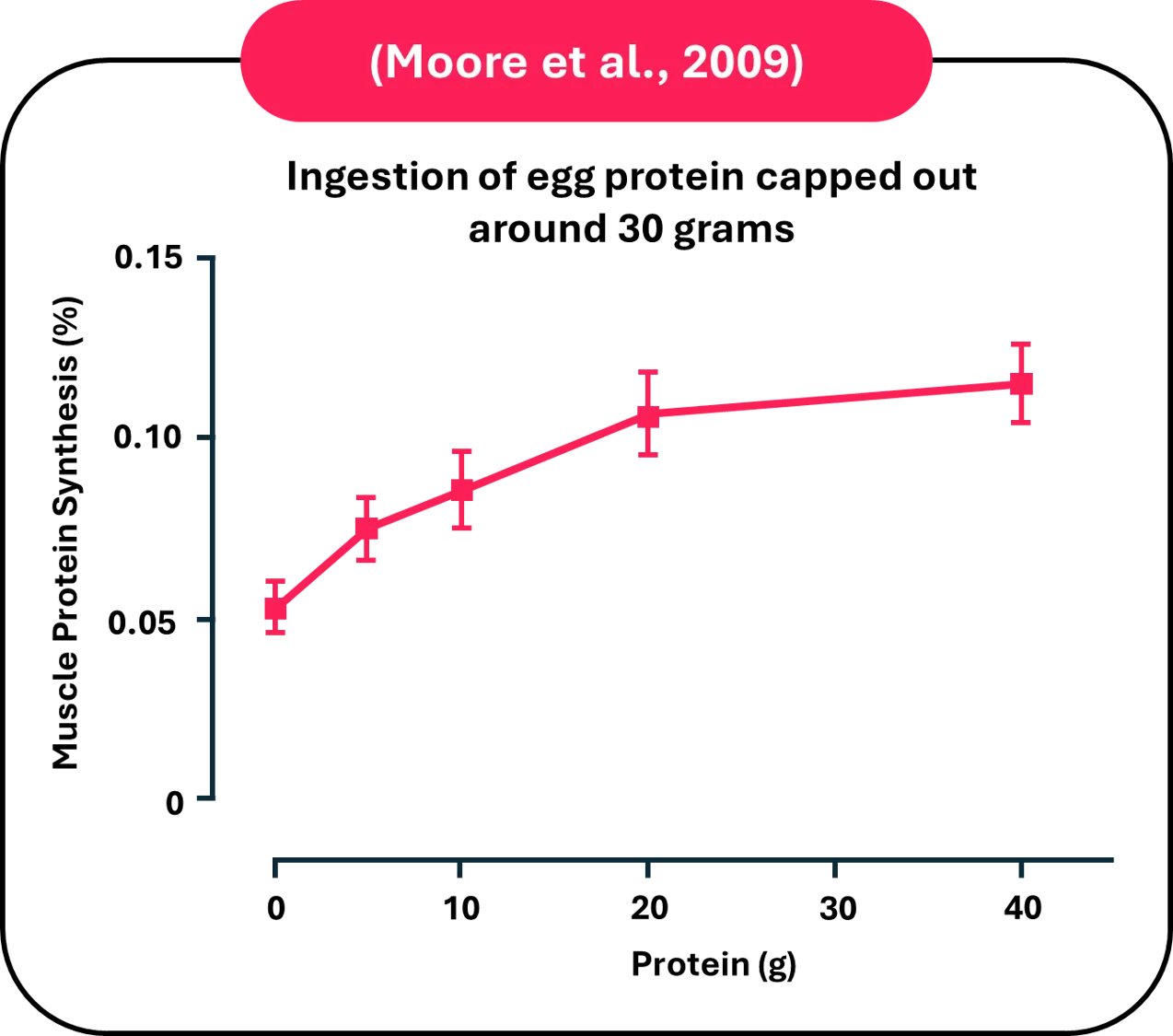
Understanding this science can help you make better choices about your protein dose. It’s not just about quantity, but quality and timing too. By choosing protein sources high in leucine and other essential amino acids, and spreading your intake throughout the day, you can maximize your growth potential. Remember, building muscle is a marathon, not a sprint. Consistency in your protein intake, combined with proper strength training and recovery, is key to seeing those gains you’re after. So, armed with this knowledge, go forth and conquer those gains!
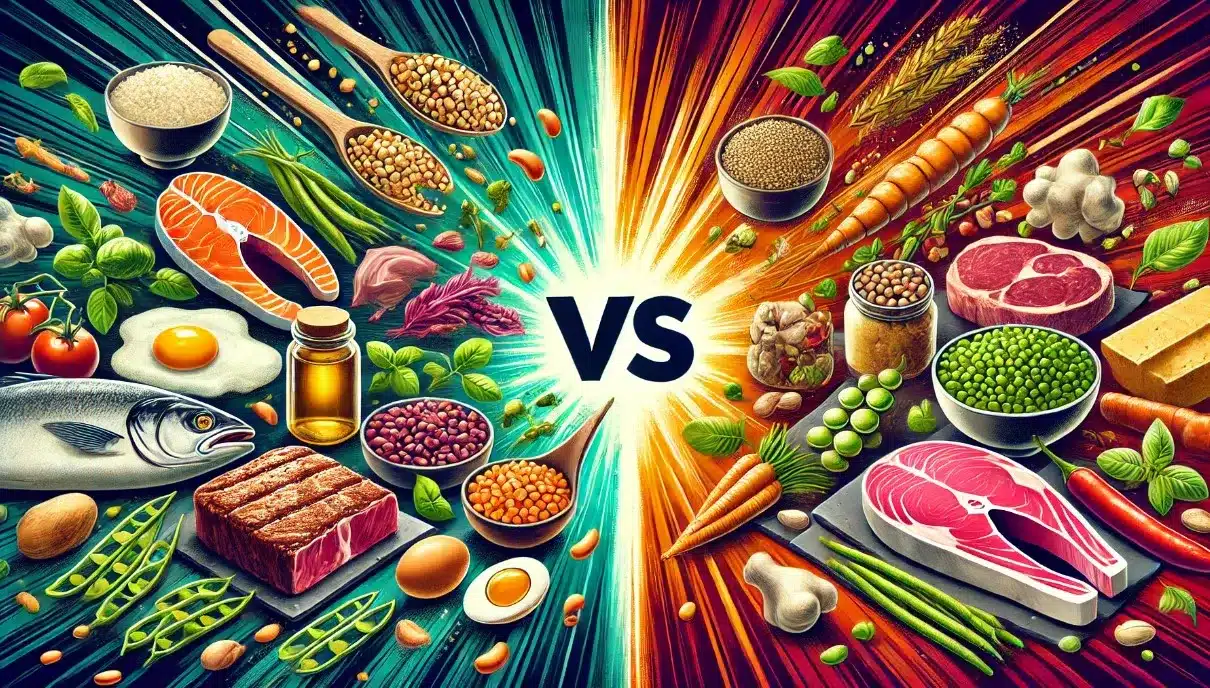
Animal Proteins vs Plant Proteins: The Showdown
Let’s settle this debate once and for all. Animal proteins have been flexing their muscles in the scientific arena, and it’s time we acknowledge their superiority. A recent systematic review and meta-analysis has put animal and plant proteins head-to-head, and the results are as clear as a perfectly grilled chicken breast. For those looking to build muscle, incorporating high-protein foods into your diet is essential.
The study, which analyzed data from 18 randomized controlled trials, found that animal proteins have a slight edge over their plant-based counterparts when it comes to building lean mass. Now, before you vegans start throwing your tofu at me, hear me out. This advantage was particularly pronounced in younger adults (under 50), who showed significant gains in both absolute and percent lean mass when consuming animal proteins.
Why the superiority, you ask? It’s all about quality and composition. Animal proteins are the bodybuilding equivalent of a luxury sports car – they come fully loaded with all the essential amino acids for muscle hypertrophy. These proteins are particularly rich in leucine, the MVP of muscle protein synthesis. Plant proteins, while still valuable, are more like a reliable sedan – they’ll get you there, but you might need to make a few pit stops along the way.
The study found that the weighted mean difference for absolute lean mass was 0.41 kg in favor of animal proteins. That might not sound like much, but in the world of gains, every gram counts. For percent lean mass, the difference was 0.50%. Again, small numbers, big impact. But here’s where it gets interesting. The benefits of animal proteins were observed regardless of whether participants were pumping iron or not. That’s right – even without strength training, animal proteins still came out on top for muscle hypertrophy. It’s like they’re doing the heavy lifting for you (but please, still hit the gym).
Now, don’t get me wrong. Plant proteins aren’t useless. They’re like the hardworking underdog of the protein world. They can still support muscle growth and strength, just not quite as effectively as their animal-based brethren. If you’re plant-based, you’ll need to be a bit more strategic, combining different sources like bean s to get a complete amino acid profile.
Here’s a quick comparison to put things in perspective:
| Protein Source | Muscle Growth Effectiveness | Leucine Content | Digestibility |
|---|---|---|---|
| Animal Proteins | High | High | High |
| Plant Proteins | Moderate | Moderate | Moderate |
Remember, this isn’t about bashing plant proteins. It’s about understanding the science and making informed choices. If your goal is to maximize muscle growth, especially if you’re under 50, animal proteins should be your go-to. But if you’re plant-based, don’t despair. With careful planning and perhaps some supplementation, you can still make impressive gains. In the end, the protein showdown has a clear winner, but it’s not a knockout. Animal proteins take the title, but plant proteins put up a good fight. Choose your best protein sources for muscle growth wisely, and may your gains be ever in your favor.
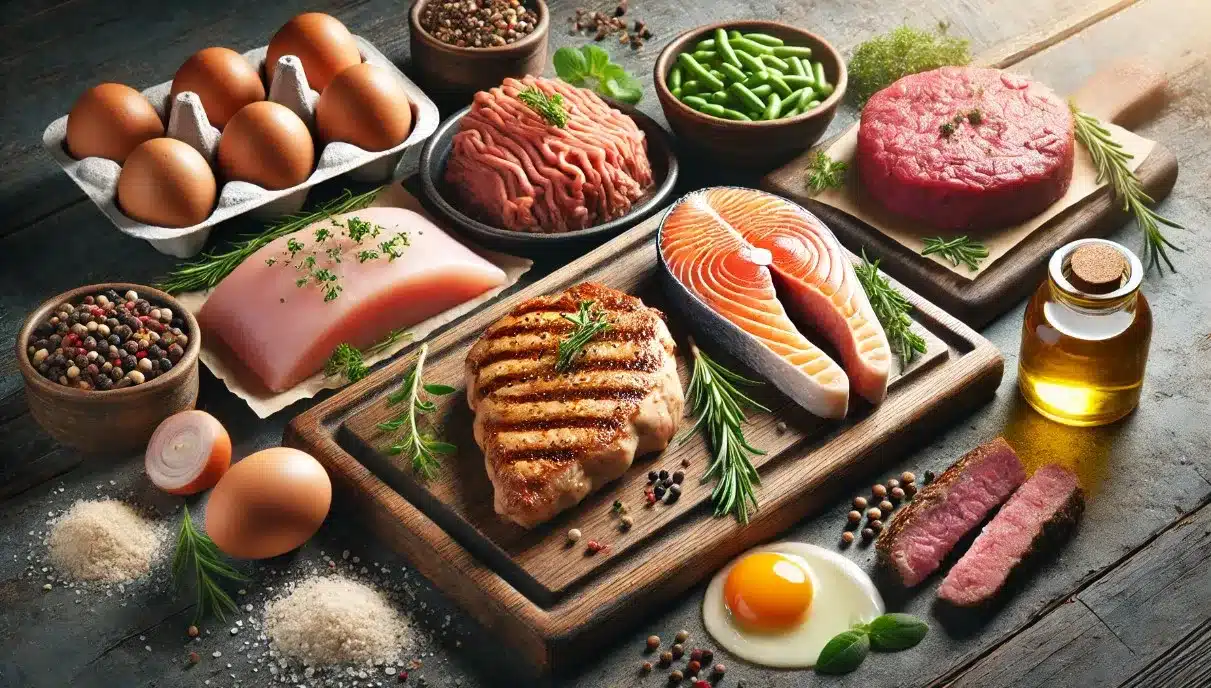
What are the Top 5 Highest Protein Foods?
When it comes to building muscle, not all proteins are created equal. Animal proteins consistently outperform plant-based options in supporting lean mass and muscle hypertrophy. Let’s dive into the top animal protein sources that’ll have you packing on mass like it’s your job.
Whey Protein
Whey protein is the undisputed champion of muscle-building proteins. It’s like the Usain Bolt of the protein world – fast, efficient, and leaves the competition in the dust. Here’s why:
- Rapid Absorption: Whey protein is quickly digested and absorbed, flooding your muscles with amino acids when they need it most.
- High Leucine Content: Leucine is the MVP of amino acids for muscle growth, and whey is loaded with it.
- Muscle Protein Synthesis: Studies show that whey protein significantly boosts muscle protein synthesis both at rest and after exercise.
In a study comparing whey, casein, and soy protein, whey came out on top for stimulating muscle protein synthesis. It’s particularly effective post-workout when your muscles are crying out for the best protein sources for muscle growth.
Casein Protein
If whey protein is the sprinter, casein is the marathon runner of proteins. It’s the slow and steady option that wins the race for overnight muscle growth.
- Slow Digestion: Casein forms a gel in the stomach, releasing amino acids slowly over several hours.
- Sustained Release: This slow release provides a steady stream of amino acids, perfect for preventing muscle breakdown during fasting periods.
- Complementary to Whey: While whey spikes muscle protein synthesis, casein maintains it over a longer period.
Casein is your go-to protein before bed or during long periods without food. It’s like having a slow-drip IV of amino acids keeping your muscles happy while you sleep.
Egg Protein
Eggs are nature’s multivitamin wrapped in a protein package. They’re so nutritionally complete that they can turn a single cell into an entire chicken. Here’s why they’re fantastic for muscle growth: eggs are among the best protein sources for muscle growth
- Complete Amino Acid Profile: Eggs contain all nine essential amino acids in the right ratios.
- High Biological Value: Your body can use more of the protein from eggs compared to many other sources.
- Versatility: You can prepare eggs in countless ways, making them easy to incorporate into any diet.
Fun fact: Rocky Balboa was onto something with those raw egg shakes, but please, for the love of gainz, cook your eggs. Salmonella isn’t going to help you build muscle.
Lean Meats (Chicken, Turkey, Lean Beef)
Lean meats are the workhorses of the muscle-building world. They’re packed with high-quality protein and other nutrients essential for muscle growth.
- Chicken Breast: The classic bodybuilder’s staple. It’s low in fat, high in protein, and versatile enough to eat every day (though your taste buds might revolt).
- Turkey: Similar to chicken but with a slightly different nutrient profile. It’s an excellent source of B vitamins, which are crucial for energy production.
- Lean Beef: Don’t fear the red meat. Lean cuts of beef are packed with protein, iron, and zinc – all essential for muscle growth and recovery.
These meats aren’t just protein powerhouses; they’re also rich in nutrients like iron and B-vitamins that support overall health and muscle function. For more on how to effectively increase your protein intake to support muscle growth, consider reading about high-protein foods.
| Protein Source | Protein per 100g | Leucine Content | Digestion Speed |
|---|---|---|---|
| Whey Protein | 80-90g | High | Fast |
| Casein Protein | 80-90g | Moderate | Slow |
| Egg Protein | 12-13g | Moderate | Moderate |
| Chicken Breast | 31g | High | Moderate |
| Turkey Breast | 29g | High | Moderate |
| Lean Beef | 26-27g | High | Moderate |
Incorporating a variety of these protein sources into your diet will ensure you’re giving your muscles the amino acids they need to grow and recover. Mix it up to keep your taste buds happy and your muscles growing. After all, the best protein is the one you’ll actually eat consistently.

Plant-Based Protein Options
Let’s face it, not everyone’s jumping on the animal protein bandwagon. Whether you’re a dedicated vegan or just trying to mix things up, plant-based proteins can still contribute to your muscle mass goals. However, you’ll need to be a bit more strategic.
Plant proteins generally have a lower biological value compared to animal proteins. This means they’re not as efficiently used by the body for muscle protein synthesis. For instance, soy protein is often the poster child for plant-based muscle building. It’s a complete protein, meaning it contains all nine essential amino acids. In studies comparing soy to whey protein, soy does stimulate muscle protein synthesis, albeit to a lesser extent. But hey, some gains are better than no gains, right?
Other solid plant protein sources include:
- Pea protein: High in branched-chain amino acids (BCAAs), especially leucine.
- Rice protein: When combined with pea protein, it forms a complete amino acid profile.
- Hemp protein: Contains all essential amino acids and beneficial omega-3 fatty acids.
- Quinoa: A rare complete protein source from the plant kingdom.
Here’s the secret sauce: combining different plant proteins. This strategy helps create a more complete amino acid profile, mimicking the benefits of animal proteins. For example, rice and beans together form a complete protein.
| Protein Source | Protein per 100g | Complete Protein? | Key Benefits |
|---|---|---|---|
| Soy Protein | 36g | Yes | All essential amino acids |
| Pea Protein | 80g | No | High in BCAAs |
| Rice Protein | 78g | No | Low allergen risk |
| Hemp Protein | 50g | Yes | Contains omega-3s |
| Quinoa | 14g | Yes | High in fiber |
Now, let’s address the elephant in the room. Plant proteins typically have lower leucine content compared to animal proteins. Leucine is the MVP of amino acids when it comes to triggering muscle protein synthesis for muscle hypertrophy. To compensate, you might need to consume more plant protein to achieve the same anabolic effect as animal protein.
Here’s a pro tip: if you’re relying heavily on plant proteins, consider supplementing with a plant-based BCAA powder. This can help boost the leucine content of your meals and potentially enhance skeletal muscle protein synthesis.
Remember, while plant proteins might not be the heavyweight champions in the muscle-building arena, they’re far from being benchwarmers. With smart combinations and adequate intake, you can still pack on muscle mass. Plus, you’ll be getting a host of other benefits like fiber, antioxidants, and phytonutrients that come with plant-based foods.
So, whether you’re Team Animal Protein or Team Plant Protein, the most important thing is consistency in your strength training and diet. After all, the best protein source for muscle growth is the one you’ll actually stick to in the long run.

The Collagen Conundrum
Collagen has been making waves in the fitness world lately, but let’s cut through the hype and get to the mass of the matter. As a protein, collagen plays a crucial role in our body’s structure, forming connective tissues, skin, and bones. But when it comes to muscle hypertrophy, collagen falls short of the mark.
Let’s compare collagen to the reigning champion of muscle-building proteins: whey. In a recent study, researchers pitted whey protein against leucine-enriched collagen peptides during a 10-week strength training program. The results? Whey protein flexed its muscles, showing significantly larger increases in skeletal muscle thickness compared to collagen.
Here’s the breakdown:
- Whey protein group: Vastus lateralis thickness increased with a Cohen’s d effect size of 0.68
- Collagen group: Vastus lateralis thickness increased with a Cohen’s d effect size of only 0.38
The biceps brachii told a similar story:
- Whey protein group: Effect size of 0.61
- Collagen group: Effect size of 0.35
Why does whey leave collagen in the dust when it comes to skeletal muscle growth? It’s all about the amino acid profile. Whey is rich in essential amino acids, particularly leucine, which is the key that unlocks muscle protein synthesis. Collagen, on the other hand, is like trying to open a lock with a banana peel – it’s just not equipped for the job.
Remember, when it comes to building muscle mass, not all proteins are created equal. Collagen might be the darling of the beauty industry, but in the gym, it’s whey that wears the crown. So, next time you’re reaching for a post-workout shake, make sure you’re choosing a protein that’ll give your muscles the building blocks they need for muscle hypertrophy. Your biceps will thank you for this exercise.

Optimal Protein Intake for Muscle Hypertrophy
When it comes to building muscle, protein intake is king. But how much do you really need? Let’s break it down.
Daily requirements aren’t one-size-fits-all. They depend on factors like body weight, activity level, and fitness goals. However, research provides some solid guidelines. For muscle hypertrophy and general health, aim for 1.2 to 2.2 grams of protein per kilogram of body mass daily. This range covers most individuals looking to pack on muscle mass. For more detailed guidance, exploring the significance of protein timing can further optimize muscle growth.
Interestingly, a systematic review suggests that consuming more than 1.6 grams per kilogram might not offer additional benefits for skeletal muscle growth. So, if you’re a 180-pound (81.6 kg) individual, you’d need about 130 grams of protein daily to maximize muscle gains. That’s roughly the equivalent of 4-5 chicken breasts. Sounds like a lot? It is, but spreading it out makes it manageable. Milk is one of the best protein sources for muscle growth.
Speaking of spreading it out, distribution throughout the day is crucial. Your body can only use so much protein at once for muscle synthesis. Aim for 0.40–0.55 grams of protein per kilogram per meal. For our 180-pound friend, that’s about 33-45 grams of protein per meal. For more details on muscle-building foods, check helpful resources that outline the best dietary choices for this goal.
Here’s a simple breakdown in table format:
| Body Weight (lbs) | Body Weight (kg) | Daily Protein (g) | Protein per Meal (g) |
|---|---|---|---|
| 150 | 68 | 109-150 | 27-37 |
| 180 | 82 | 131-180 | 33-45 |
| 210 | 95 | 152-209 | 38-52 |
Timing your protein intake around workouts can give you an extra edge for mass hypertrophy. Consuming protein within 30 minutes post-workout can enhance muscle protein synthesis. But don’t stress if you miss this window; total daily protein intake matters more than precise timing.
Remember, these are guidelines, not hard rules. Listen to your body and adjust as needed. If you’re not seeing the gains you want, try upping your intake. If you’re feeling sluggish or your digestion is off, you might be overdoing it. For more detailed insights on optimizing muscle growth, consider exploring the scientific approach to understanding how long it really takes to build muscle.
Lastly, don’t forget about quality. While hitting your protein numbers is important, the source matters too. As we’ve discussed, animal proteins like whey, eggs, and lean meats are superior for muscle growth. They’re packed with essential amino acids, especially leucine, which is the key player in muscle protein synthesis.
So, there you have it. Eat enough protein, spread it out, and choose high-quality sources. Your muscles will thank you. Now, if you’ll excuse me, I have a date with a protein shake and some dumbbells.
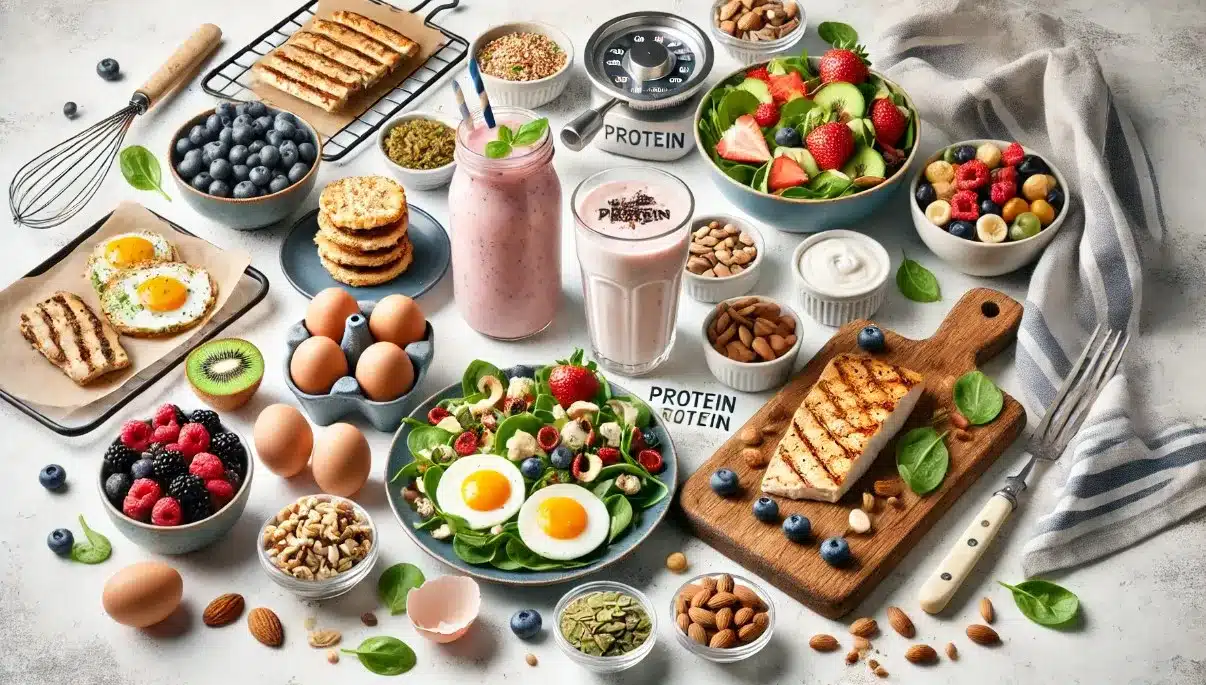
Practical Tips for Incorporating Protein into Your Diet
Alright, let’s get down to business. You’ve got the knowledge, now it’s time to put it into action. Here are some practical tips to help you beef up your protein intake without turning your life upside down.
Meal Planning: Your Secret Weapon
First things first, meal planning is your new best friend. Trust me, it’s not as boring as it sounds. Here’s how to make it work:
- Batch cooking: Spend a few hours on Sunday prepping your protein sources for the week. Grill a bunch of chicken breasts, cook a pot of lean ground beef, or bake some salmon fillets. Store them in portion-sized containers, and you’re set for the week.
- Protein-centric meals: Build your meals around your protein source. Start with your chicken, fish, or lean beef, then add your carbs and veggies. It’s simple, but effective.
- Snack smart: Keep high-protein snacks on hand. Hard-boiled eggs, Greek yogurt, or a handful of nuts can help you hit your protein goals between meals.
Supplementation: The Cherry on Top
Protein supplements aren’t magic, but they can be damn convenient. Here’s how to use them wisely:
- Whey protein: It’s fast-absorbing and perfect for post-workout shakes. Mix it with water or milk, or blend it into a smoothie with some fruit for a tasty protein boost.
- Casein protein: This slow-digesting protein is great before bed. It’ll keep your muscles fed while you sleep, which is pretty cool when you think about it.
- Protein bars: They’re handy for on-the-go situations, but be picky. Many are glorified candy bars. Look for ones with at least 20g of protein and minimal added sugars.
Remember, supplements are just that – supplements. They’re not meant to replace whole food sources of protein.
Balancing Act: Protein and Other Macros
Don’t get so caught up in protein that you forget about carbs and fats. They’re important too. Here’s a quick guide:
| Macronutrient | Recommended Intake (% of total calories) |
|---|---|
| Protein | 20-35% |
| Carbohydrates | 45-65% |
| Fats | 20-35% |
This isn’t set in stone, but it’s a good starting point. Adjust based on your goals and how your body responds.
Sneaky Protein Hacks
Here are some tricks to bump up your protein intake without much effort:
- Greek yogurt swap: Use Greek yogurt instead of sour cream or mayo in dips and dressings. More protein, less fat.
- Protein-packed breakfast: Swap your morning cereal for a protein-rich option like eggs or a protein smoothie. Your muscles will thank you.
- Legume it up: Add beans or lentils to soups, salads, and pasta dishes. They’re high in protein and fiber.
- Cheese, please: A sprinkle of Parmesan or a slice of cheddar can add a nice protein boost to your meals.
- Protein-rich desserts: Who says desserts can’t be protein-packed? Try protein puddings or homemade protein bars.
Remember, consistency is key. You don’t need to turn into a protein-obsessed maniac overnight. Start with small changes and build from there. Before you know it, you’ll be hitting your protein goals without even thinking about it. And hey, if all else fails, there’s always the classic “chicken, broccoli, and rice” bodybuilder special. But let’s be honest, life’s too short for that kind of monotony. Mix it up, have fun with it, and watch those gains roll in with a healthy diet.
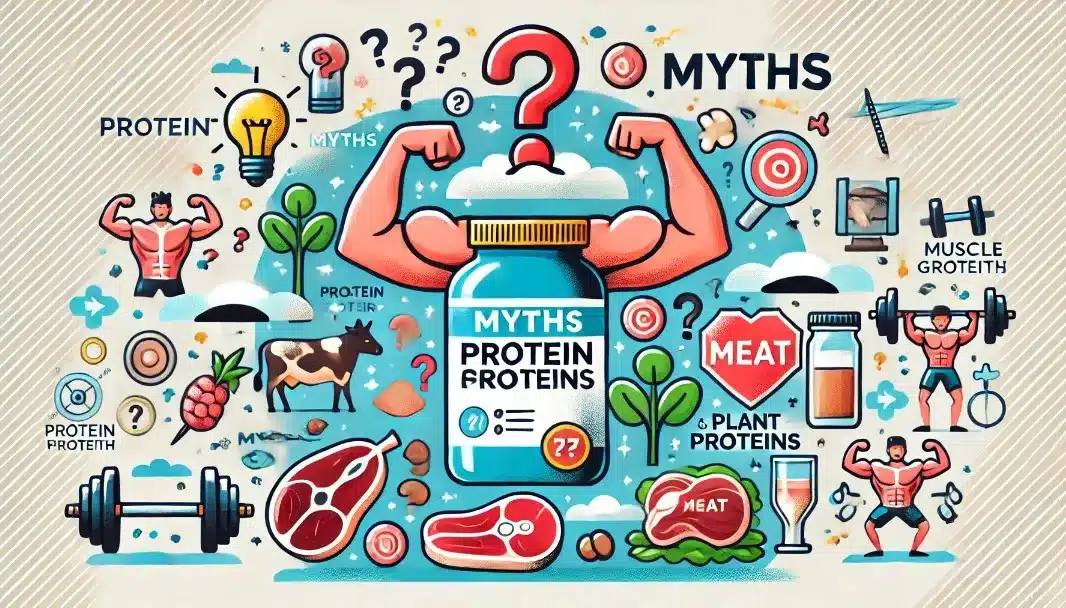
Common Myths About Protein and Muscle Growth
Let’s bust some myths, shall we? The fitness world is rife with protein-related misconceptions that can derail your gains faster than you can say “bro science.” Time to separate fact from fiction and get your protein game on point.
Myth 1: More Protein Always Equals More Muscle
Ah, the classic “if some is good, more must be better” fallacy. Sorry to burst your bubble, but downing protein shakes like they’re going out of style won’t turn you into the Hulk overnight. While adequate protein intake is crucial for muscle growth, there’s a limit to how much your body can use effectively.
Research suggests that consuming more than 1.6 grams of protein per kilogram of body weight per day doesn’t provide additional benefits for muscle mass growth. That’s right, folks – there’s a ceiling to protein’s magical muscle-building powers. So, save your money (and your digestive system) and focus on hitting that sweet spot rather than force-feeding yourself protein at every turn. For more in-depth understanding, considering the timing and the amount of protein intake could be crucial. Explore more on protein timing for muscle growth to optimize your nutrition strategy.
Myth 2: Plant Proteins Are Just as Effective as Animal Proteins
Now, don’t get me wrong – plant proteins have their place in a healthy diet. But when it comes to muscle growth, animal proteins generally have the edge. A systematic review comparing animal and plant proteins found that animal proteins were more effective in supporting lean mass gains, especially in younger adults.
Why? It’s all about the amino acid profile. Animal proteins typically contain a more complete spectrum of essential amino acids, particularly leucine – the MVP of muscle protein synthesis. So while you can certainly build muscle on a plant-based diet, you might need to work a bit harder to optimize your protein intake. For more insights on optimizing protein intake for muscle growth, muscle-building foods can offer valuable information.
Myth 3: Protein Timing Is Everything
You’ve probably heard the “anabolic window” theory – that you need to chug a protein shake within 30 minutes of your workout or kiss your gains goodbye. While protein timing can be beneficial, it’s not the be-all and end-all of muscle growth.
What matters more is your total daily protein intake and its distribution throughout the day. Aim for 0.40–0.55 grams of protein per kilogram of body weight per meal, spread across 3-4 meals. This approach ensures a steady supply of amino acids for muscle protein synthesis throughout the day, supporting muscle hypertrophy.
Myth 4: High-Protein Diets Are Bad for Your Kidneys
This myth is harder to kill than a cockroach in a nuclear apocalypse. Unless you have pre-existing kidney issues, a high-protein diet is unlikely to harm your kidneys. Numerous studies have shown that healthy individuals can safely consume high amounts of protein without adverse effects on kidney function.
That said, if you have any concerns about your kidney health, it’s always wise to consult with a healthcare professional before significantly increasing your protein intake. Better safe than sorry, right?
Myth 5: All Protein Sources Are Created Equal
If you think protein is protein, regardless of the source, think again. Different protein sources have varying biological values, digestibility, and amino acid profiles. For instance, whey protein is rapidly absorbed and has a high leucine content, making it excellent for post-workout recovery. Casein, on the other hand, is slow-digesting and can provide a sustained release of amino acids, making it ideal before bed.
Even within animal proteins, there are differences. A study comparing whey protein to leucine-matched collagen peptides found that whey was superior for increasing muscle mass thickness during strength training. So, while all proteins can contribute to muscle growth, some are more efficient than others.
| Protein Source | Absorption Rate | Leucine Content | Best Use |
|---|---|---|---|
| Whey | Fast | High | Post-workout |
| Casein | Slow | Moderate | Before bed |
| Egg | Moderate | Moderate | Any time |
| Collagen | Moderate | Low | Joint health |
Myth 6: You Can’t Build Muscle Without Supplements
While protein supplements can be convenient, they’re not essential for muscle growth. Whole food sources of protein can be just as effective – and often more nutritious. Lean meats, fish, eggs, and dairy products provide high-quality protein along with other essential nutrients.
That said, supplements can be useful for those struggling to meet their protein needs through diet alone. Just remember, they’re called supplements for a reason – they’re meant to supplement a balanced diet for health, not replace it.
By debunking these common myths, you’re now armed with the knowledge to make informed decisions about your protein intake. Remember, when it comes to nutrition, there’s rarely a one-size-fits-all approach. Experiment, listen to your body, and find what works best for you. And if all else fails, just remember: gains are made in the kitchen as much as in the gym. Now go forth and conquer those protein goals!
Conclusion
Alright, let’s wrap this up like a perfectly rolled burrito-packed with protein, of course. We’ve journeyed through the protein-packed landscape of muscle growth, and it’s clear that not all proteins are created equal. Animal proteins, with their complete amino acid profiles and high leucine content, take the crown when it comes to building those mass gains.
Remember, while plant proteins have their place, they’re like the backup dancers to animal proteins’ lead singer performance. Whey protein, the swift ninja of the protein world, strikes fast and hard, especially post-workout. Casein, on the other hand, is the slow and steady tortoise, perfect for keeping your muscles fed through the night.
Don’t forget about our friend egg protein-it’s not just for breakfast anymore. And lean meats? They’re the reliable workhorses of the protein world, delivering a solid punch of muscle-building power with every bite. These are some of the best protein sources for muscle growth.
Now, don’t get me wrong-I’m not saying you should start grazing in the nearest field. But if you’re serious about maximizing muscle growth, animal proteins should be your go-to for mass. They’re like the cheat codes for your muscles, giving you that extra edge in the game of gains.
In the end, building muscle is a science, but it doesn’t have to be rocket science. Focus on high-quality animal proteins, time your intake right, and stay consistent. Before you know it, you’ll be turning heads and splitting seams. Now go forth and protein up – your muscles are waiting!
Frequently Asked Questions
What are the top 10 protein sources for bodybuilding?
When it comes to bodybuilding, protein is an essential nutrient that helps support muscle growth, repair, and recovery. Incorporating a variety of high-quality protein sources into your diet is crucial for maximizing muscle gains and overall performance. Here are the top 10 protein sources that bodybuilders should consider including in their meal plans:
1. Chicken breast: Lean and protein-rich, chicken breast is a staple for bodybuilders as it provides a complete source of amino acids necessary for muscle building.
2. Eggs: Eggs are not only a versatile protein source but also contain essential nutrients like choline and vitamin D that contribute to overall health and muscle function.
3. Greek yogurt: Packed with protein and probiotics, Greek yogurt is an excellent post-workout snack that helps with muscle recovery and digestion.
4. Salmon: Rich in omega-3 fatty acids and protein, salmon is a great choice for bodybuilders looking to promote muscle growth and reduce inflammation.
5. Lean beef: Beef is a high-quality protein source that also provides important nutrients like iron and zinc, which support muscle function and recovery.
6. Cottage cheese: Low in fat and high in casein protein, cottage cheese is a slow-digesting option that can help sustain muscle protein synthesis overnight.
7. Quinoa: A plant-based complete protein, quinoa is a great alternative for vegetarian bodybuilders looking to meet their protein needs.
8. Lentils: Another plant-based protein source, lentils are high in fiber and protein, making them a nutrient-dense option for muscle recovery and energy.
9. Tofu: Tofu is a versatile source of plant-based protein that also contains important minerals like calcium and iron to support muscle health.
10. Whey protein: Whey protein powder is popular among bodybuilders for its fast absorption and high biological value, making it ideal for post-workout muscle recovery and growth.
Incorporating a combination of these top 10 protein sources into your daily diet can help you optimize your muscle-building efforts and support your overall fitness goals. Remember to pair your protein intake with a balanced diet and proper training regimen for the best results in your bodybuilding journey.
What is the best my protein for gaining muscle?
When it comes to gaining muscle, the best protein for maximizing results is typically one that is easily digestible and rich in essential amino acids. Whey protein is often considered the top choice for muscle growth due to its fast absorption rate and high content of branched-chain amino acids (BCAAs), particularly leucine, which plays a key role in stimulating muscle protein synthesis.
Another excellent option for muscle building is casein protein, which is a slow-digesting protein that can provide a steady release of amino acids over a longer period of time, making it ideal for consumption before bed or as a meal replacement. Plant-based proteins such as pea, rice, or hemp protein are also gaining popularity among those looking for alternatives to animal-based proteins.
Ultimately, the best protein for gaining muscle depends on individual preferences, dietary restrictions, and fitness goals. It’s important to consider factors such as taste, mixability, and price when choosing a protein powder to ensure consistency in consumption and adherence to your muscle-building regimen. Experimenting with different types of protein sources and finding what works best for your body is key to achieving optimal muscle gains.
What is the Best Protein Supplement for Muscle Growth?
When it comes to choosing the best protein supplement for muscle growth, there are several factors to consider. Whey protein is often considered the top choice for muscle building due to its high amino acid content and fast absorption rate. It contains all essential amino acids needed for muscle repair and growth, making it ideal for post-workout nutrition. Whey protein isolate, in particular, is a highly purified form of whey that is quickly digested and contains minimal carbs and fats, making it a popular option for those focusing on lean muscle gains.
Another effective protein supplement for muscle growth is casein protein. Unlike whey, casein is a slow-digesting protein that provides a steady release of amino acids over a longer period, which can be beneficial for muscle repair and growth during periods of fasting, such as overnight. Casein is often recommended as a bedtime protein supplement to support overnight muscle recovery.
For those who follow a plant-based diet or have lactose intolerances, pea protein and soy protein are viable alternatives that can still support muscle growth. Pea protein is rich in essential amino acids and is easily digestible, while soy protein contains all essential amino acids and has been shown to promote muscle protein synthesis.
References
Jacinto, J. L., Nunes, J. P., Gorissen, S. H. M., Capel, D. M. G., Bernardes, A. G., Ribeiro, A. S., Cyrino, E. S., Phillips, S. M., & Aguiar, A. F. (2022). Whey Protein Supplementation Is Superior to Leucine-Matched Collagen Peptides to Increase Muscle Thickness During a 10-Week Resistance Training Program in Untrained Young Adults. International Journal of Sport Nutrition and Exercise Metabolism, 32(3), 133–143. https://doi.org/10.1123/ijsnem.2021-0265
Jäger, R., Kerksick, C. M., Campbell, B. I., Cribb, P. J., Wells, S. D., Skwiat, T. M., Purpura, M., Ziegenfuss, T. N., Ferrando, A. A., Arent, S. M., Smith-Ryan, A. E., Stout, J. R., Arciero, P. J., Ormsbee, M. J., Taylor, L. W., Wilborn, C. D., Kalman, D. S., Kreider, R. B., Willoughby, D. S., … Antonio, J. (2017). International Society of Sports Nutrition Position Stand: Protein and exercise. Journal of the International Society of Sports Nutrition, 14(1), 20. https://doi.org/10.1186/s12970-017-0177-8
Ko, G.-J., Rhee, C. M., Kalantar-Zadeh, K., & Joshi, S. (2020). The Effects of High-Protein Diets on Kidney Health and Longevity. Journal of the American Society of Nephrology : JASN, 31(8), 1667–1679. https://doi.org/10.1681/ASN.2020010028
Lim, M. T., Pan, B. J., Toh, D. W. K., Sutanto, C. N., & Kim, J. E. (2021). Animal Protein versus Plant Protein in Supporting Lean Mass and Muscle Strength: A Systematic Review and Meta-Analysis of Randomized Controlled Trials. Nutrients, 13(2), 661. https://doi.org/10.3390/nu13020661
Moore, D. R., Robinson, M. J., Fry, J. L., Tang, J. E., Glover, E. I., Wilkinson, S. B., Prior, T., Tarnopolsky, M. A., & Phillips, S. M. (2009). Ingested protein dose response of muscle and albumin protein synthesis after resistance exercise in young men. The American Journal of Clinical Nutrition, 89(1), 161–168. https://doi.org/10.3945/ajcn.2008.26401
Tang, J. E., Moore, D. R., Kujbida, G. W., Tarnopolsky, M. A., & Phillips, S. M. (2009). Ingestion of whey hydrolysate, casein, or soy protein isolate: Effects on mixed muscle protein synthesis at rest and following resistance exercise in young men. Journal of Applied Physiology (Bethesda, Md.: 1985), 107(3), 987–992. https://doi.org/10.1152/japplphysiol.00076.2009
Zdzieblik, D., Oesser, S., Baumstark, M. W., Gollhofer, A., & König, D. (2015). Collagen peptide supplementation in combination with resistance training improves body composition and increases muscle strength in elderly sarcopenic men: A randomised controlled trial. The British Journal of Nutrition, 114(8), 1237–1245. https://doi.org/10.1017/S0007114515002810

